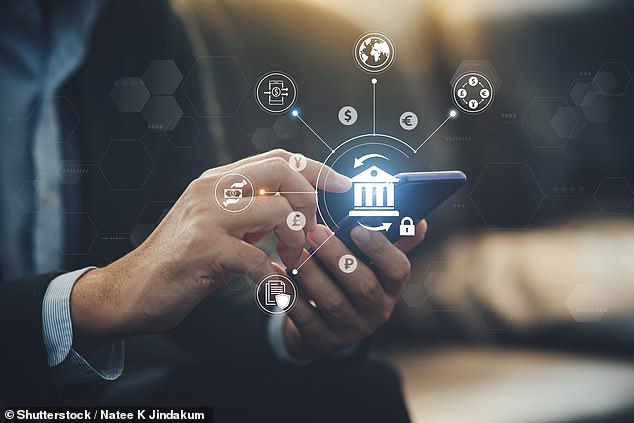The banking process has changed vastly in recent decades, first with online banking and now app-based services.
With these changes though, has come something of a regression in customer experience and ease of use.
While customers once had to make do with paper statements sent to their door, it was also far more commonplace to visit your local bank branch for services and appointments.
But with bank branches increasingly closing – some 163 this year so far, and thousands over the past decade – and a rising number of branchless challenger banks, it is becoming harder to visit a branch and speak to someone face to face.
This is a problem that Udi Ziv, chief executive of Personetics, says cognitive banking technology has the potential to address.

As few as nine per cent of people received financial advice in the past year, according to figures from the FCA
Ziv told This is Money: ‘The way the banking industry started was all about people. There was always a banker in the mix and they had a degree of responsibility for their customers’ financial wellness.’
Banks, Ziv said, are now at a stage where nothing is personal, but instead a ‘very efficient and detached process’.
Most people don’t seek financial advice, whether because they don’t think it for them, it is too expensive, or they simply don’t realise that it is an option.
In fact, as few as 9 per cent of people received financial advice in the past year, according to figures from the FCA.
Ziv added: ‘It is creating a significant problem for the vast majority of the people on earth, because most people don’t have advisers, cannot afford the financial advisers, and all they get now is a digital app or website that really doesn’t help them or help their financial wellness.’
What is cognitive banking and can it help close the advice gap?
Cognitive banking harnesses customer data, which banks have access to an enormous amount of, in order to build a picture of a customer’s financial needs and habits.
This means that a bank can offer insights and recommendations to customers based on their previous spending and saving activity.
Instead of simply showing a list of transactions, banking apps will be able to identify your potential financial needs, such as highlighting duplicate subscriptions or predicting that you could enter your overdraft within a set number of days.
Ziv says this also allows banks to target product advertising at the right customers, rather than blanket promoting products to users who don’t need or want them.
He said: ‘It’s about allowing you to act upon it before it’s too late, before you miss an opportunity, or you get into a problem.’
Ziv says this improves the experience for customers, whose needs are being better met, and also gives banks better customer retention and higher engagement.
In comparison to banking, Ziv says, other sectors are well ahead in this kind of technology.
Ziv said: ‘The Amazons and Netflixes and Spotifys of the world have done the exact opposite to banks. Everything is digital, but in the process it’s all about understanding me as an individual, making every interaction purposeful from their perspective.
‘There’s nothing that is not per my needs – or at least what they predict are my needs – and they allow me to act on them with the click of a button.
He said: ‘The one thing that is most important to people, their financial wellness, is ignored by most financial institutions… cognitive banking was born to bridge that gap.
Banks though, are slowly catching on, and doing so might be a matter of survival.
Personetics alone is already working with banks in 30 countries and serving 150million people around the world, while there are a number of other firms also working in the space.
In the UK, banks such as Santander and Metro Bank use Personetics’ technology.
In the age of digital banking, it is also easier for customers to use different providers for different products, seeking out the best deal for whichever product they are looking for.
Increasingly, banks need to work out how they can compete with their peers.
Ziv said: ‘In the past, every person had one bank they did business with, so primacy was not an issue. Everything you were doing in your banking life was with that one bank.
‘Fast forward to 2025, depending on geography, a normal person would have between three and five banking-type applications on their phone.’
A majority, some 59 per cent, of consumers now say they have purchased a financial product from an institution other than their main bank in the past year. For Gen Z, this figure is as high as 82 per cent.
A similar number, some 84 per cent, said they would switch banks for a ‘quality banking experience’.
‘That’s horrible for a bank,’ Ziv said.
By allowing banks to see how their users are interacting with competitors, Ziv says cognitive banking can help banks to offer more attractive products to customers to aid retention, while also giving the end consumer better value for money on a product that suits their needs.
The growth of generative AI also means that those banks who choose not to leverage it to build an understanding of their customers’ needs risk falling further behind their competitors.
Ziv said: ‘We believe this is going to be the future of banking… in a few years’ time we are going to see a flood of AI use in retail banking, complementing the first generation of cognitive banking that banks are starting to adopt.’
But how receptive Britons will be to this new wave of banking and how their daily spending habits are monitored is open for debate.
SAVE MONEY, MAKE MONEY

Sipp cashback

Sipp cashback
£200 when you deposit or transfer £15,000

4.51% cash Isa

4.51% cash Isa
Trading 212: 0.66% fixed 12-month bonus

£20 off motoring

£20 off motoring
This is Money Motoring Club voucher

Up to £100 free share

Up to £100 free share
Get a free share worth £10 to £100
No fees on 30 funds
No fees on 30 funds
Potentially zero-fee investing in an Isa or Sipp
Affiliate links: If you take out a product This is Money may earn a commission. These deals are chosen by our editorial team, as we think they are worth highlighting. This does not affect our editorial independence. Terms and conditions apply on all offers.













